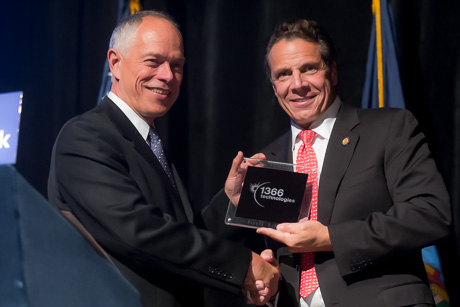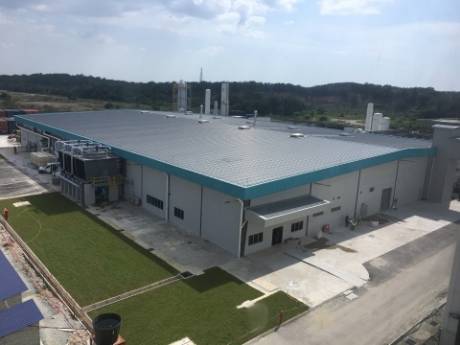
The advanced manufacturing plant that could have been in Genesee County with a little more political support will open soon in Cyberjaya, Malaysia.
Bedford, Mass.-based 1366 Technologies has been building a plant with the support of one of the companies that have invested in the startup, Hanwha Q CELLS, and announced this week the plant will open soon.
Until this week, 1366 had been unwilling to release the location of its new factory.
It will be the world's first direct wafer factory. The direct wafer process was invented at MIT and patented by 1366. It makes solar wafers much like glass is made, with silicon being poured on a flat surface. The company has claimed the process is more energy efficient and produces less waste.
In 2015, Gov. Andrew Cuomo came to Batavia to announce 1366 as the first tech company to agree to open a plant in STAMP, the advanced manufacturing project in Alabama, that would bring 1,000 mostly high-paying jobs to Genesee County.
The plan was for 1366 to invest $700 million in the plant. GCEDC and Empire State Development and other state agencies would provide $53 million in tax abatements and grants, based on certain incentives being met over 10 years.
The Department of Energy, in 2009, also promised 1366 a $150 million loan guarantee based on 1366 meeting two criteria: selecting a site for their factory and raising $100 million in private investment.
That deal fell apart on claims by Department of Energy officials that 1366 failed to select a site for its factory and had failed to raise the $100 million.
The company had raised $80 million in private equity but the DOE would not renegotiate the terms of the loan.
Rep. Chris Collins, based on a conversation with a member of his staff, was not hugely supportive of his staff and it's not clear he did much to help the process along. After 1366 announced plans to pull out of the STAMP deal, Collins questioned the company's credibility. He said at the time that 1366's announcement was evidence that the company was never serious about building a plant in Genesee County.
Based on the expectation that 1366 was coming to STAMP, with the help of Sen. Michael Ranzenhofer, the state released $33 million for development of shovel-ready infrastructure at the Alabama location.
Since 1366 pulled out of the deal nearly a year ago, GCEDC Steve Hyde has said on multiple occasions that GCEDC is talking with several prospective tenants for STAMP but so far no new deals have been announced.
As of May 1366 and the DOE were locked in a dispute over ownership of patents because of the assistance the DOE had given to 1366 early in the process of developing its technology. The Batavian is not aware of any change in the status of that dispute.
UPDATE 4:16 p.m.: In this story, and previously, we reported that 1366 withdrew from plans to build in STAMP in March. Shortly after this story published we received documents, in response to a Freedom of Information Act request, from the Department of Energy, that revealed that STAMP informed DOE of its request to withdraw its loan application on Jan. 31, 2018. There was no other new information in the set of documents.
For all of The Batavian's previous coverage of 1366, click here.
Top photo: Frank van Mierlo, CEO, 1366 Technologies, and Gov. Andrew Cuomo at the October 2015 announcement at GCC of 1366's plans to build a plant at STAMP.

Photo released by 1366 of its nearly completed plant in Cyberjaya, Malaysia.

I don't think most people
I don't think most people ever really thought 366 was ever coming here. This project has been a big sink hole for tax money year after year.
John, what did 1366 have to
John, what did 1366 have to gain by selecting STAMP if they had no intention to go there?
There was no financial benefit in it for them. They would have been required to build something to reap any of the promised benefits, including the $150 million loan guarantee from the DOE.
And they had much to lose by the delay -- thousands and thousands of dollars lost on the site planning and legal requirements and contracts for the project, plus the lost time-to-market, which has economic costs. They lost at least two years of production time because of the delays. In that, the price of coal dropped significantly and the price of solar power dropped significantly. All that lost time equals lost revenue, lost opportunity to perfect and improve their process, lost time to develop new products. There was nothing stopping them from building in Asia at the time they selected STAMP. They could have built two or more years ago at an overseas location and gotten to market sooner, grown their company faster (if they do in fact prove successful) and saved a ton of money and avoided a lot of aggravation.
I don't see how it makes any business sense to select a site with the intention of eventually pulling out. In business, delays mean lost money, lost opportunities, and the potential for market changes that harm if not destroy your business model. No business executive wants unnecessary delays.
Amazes me that a select few
Amazes me that a select few can spend millions and millions of dollars of other peoples money on foolish ideas of creating jobs and Not answer when it fails. Maybe they can build a yogurt factory. Maybe an electric car factory. Hey how about a Tim Horton's ?
Ownership of the patents is
Ownership of the patents is huge. If there is really a valid claim by the energy department then private investors could easily be left out in the cold. Without knowing just how involved the government was in developing the technology it's hard to be critical of any of it. The article states early on that it was developed at MIT. That gave me a question in my mind immediately as to why MIT doesn't have a claim. Anything that enhances renewables is something I wouldn't have a problem with government funding.
Daniel,
Daniel,
There will be interesting issues to watch around this ... with the DOE claims, without documents, just claims, it's hard to separate the politics from the reality.
As for MIT, we don't know the agreements in place before, during, or after 1366 moved forward.
I'm doing all I can to try to find out more.
I would agree with those who question subsidies for renewables if not for a few things: first, oil and coal companies get subsidies for doing nothing more than existing; new technologies need and often receive, and have throughout the history of the country, government assistance; even Alexander Hamilton sought government subsidies to build American industry (Patterson, New Jersey, wouldn't exist otherwise); the DOE loan program, despite a couple of headline failures, is one of the most successful business assistance programs in the country; 1366 is truly breakthrough technology (from what we know now) and assisting them to get into STAMP is greatly different than assisting a company develop a product for a market that is already saturated (think, greek yogurt).
If 1366 had come here it could have been an utter failure; but more than any other company GCEDC has ever assisted, it truly could have been transformative for the region and for the nation.
It's a shame Mr. Collins didn't see it that way.
Governor Cuomo announced the
Governor Cuomo announced the deal. Chris Collins was less than helpful. These are the politics that make New York so business friendly. Why would people leave?
I appreciate your diligent
I appreciate your diligent push for more information Howard. The possible variables of the whole situation are seemingly infinite. One of my 1st thoughts was some type of unwritten mission statement that made production US based. If department of energy is taking legal actions, they must have something to hang their hat on. Even when agreements are well documented, litigation, or the possibility of such can be the death knell for any business endeavor. Moving production to Malaysia puts litigation in the back seat, as production and profits accrue. So, the possibility that 1366 was simply doing a corporate dance to enhance their political/legal standing exists. And may well be more probable than we can imagine.